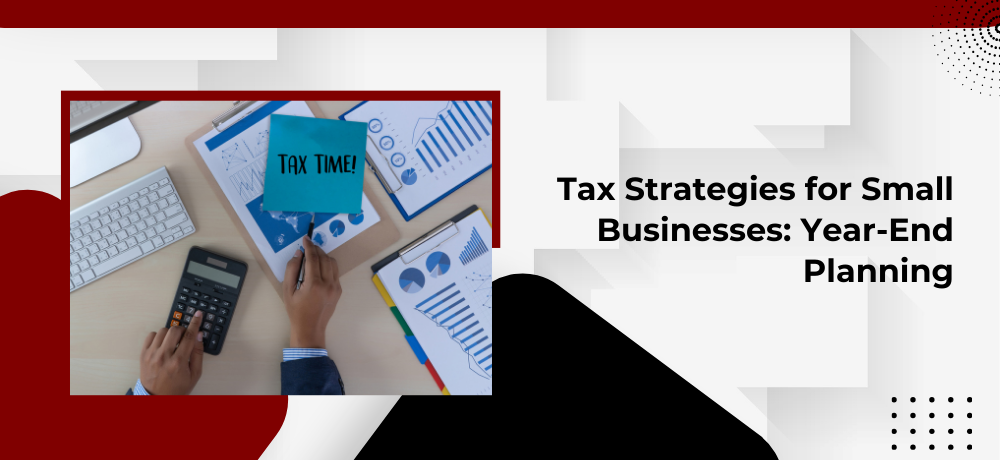Tax Strategies for Small Businesses: Year-End Planning

As the year draws to a close, small business owners are presented with a valuable opportunity to strategically manage their finances and reduce their tax liabilities. Year-end planning is a critical aspect of financial management for any small business, as it allows you to take advantage of various tax strategies and make informed decisions that can have a significant impact on your bottom line. At Rati Raithatha CPA Professional Corporation, we understand the unique challenges and opportunities that small businesses in Toronto and beyond face when it comes to tax planning and accounting. In this article, we'll explore essential tax strategies that can help your small business optimize its financial position as the year draws to a close. Whether you're a startup, a family-owned business, or a well-established company, these strategies can benefit you.
The Importance of Year-End Tax Planning
Maximizing Deductions and Credits
One of the primary goals of year-end tax planning is to maximize deductions and tax credits. Small businesses can take advantage of various deductions and credits available to reduce their taxable income and overall tax liability. Some common deductions include business expenses, depreciation, and contributions to retirement plans. By strategically timing your expenses and investments, you can optimize your tax situation.
Reviewing Your Financial Statements
Before the year ends, it's crucial to review your financial statements to assess your business's financial health. By examining your profit and loss statement, balance sheet, and cash flow statement, you can identify areas where you may need to make adjustments to minimize your tax liability. For instance, you can evaluate your accounts receivable and inventory to determine if any write-offs or adjustments are necessary.
Asset Management and Depreciation
Small businesses often have significant investments in assets like equipment, machinery, and vehicles. Year-end planning involves assessing these assets' value and determining the most advantageous depreciation methods. Proper asset management and depreciation planning can help you reduce your taxable income while ensuring compliance with tax regulations.
Tax-Efficient Business Structures
Choosing the Right Business Structure
Selecting the right business structure is a critical decision for small businesses. It impacts not only your tax liability but also your legal and financial responsibilities. Common business structures for small businesses include sole proprietorships, partnerships, limited liability companies (LLCs), and S corporations. Each structure has its tax advantages and disadvantages. Consulting with a tax professional can help you determine which structure is best suited for your business.
Taking Advantage of Pass-Through Taxation
For many small businesses, pass-through taxation is a favorable option. It allows business income to "pass-through" to the owners' individual tax returns, avoiding the double taxation that corporations face. Pass-through entities, such as sole proprietorships, partnerships, and S corporations, can benefit from potential tax savings and simplification of tax reporting.
Evaluating Tax-Efficient Compensation Strategies
Year-end planning should also consider how you compensate yourself and your employees. Different compensation methods, such as salary, dividends, or bonuses, have varying tax implications. Balancing your compensation strategy to minimize overall tax liability while remaining competitive in the job market is essential.
Strategic Tax Credits and Incentives
Research and Development Tax Credits
Small businesses engaged in research and development (R&D) activities may qualify for R&D tax credits. These credits can significantly reduce tax liability and provide incentives for innovation. Make sure to identify and document eligible R&D expenses to take full advantage of this valuable tax credit.
Employee-Related Credits
Several tax credits are available for businesses that hire employees from certain target groups, such as veterans, individuals with disabilities, or disadvantaged youth. These credits can serve as an incentive to hire and retain employees while reducing your tax liability.
Green Energy and Sustainability Incentives
As environmental sustainability gains importance, businesses investing in energy-efficient technologies or renewable energy sources can benefit from various tax incentives and credits. Year-end planning should consider these opportunities to promote both sustainability and tax savings.
Record Keeping and Compliance
Organizing Your Financial Records
Effective tax planning and accounting rely on well-organized financial records. Keeping thorough and accurate records throughout the year simplifies the year-end tax process, reduces the risk of errors, and ensures compliance with tax regulations. Consider implementing digital accounting solutions for improved record-keeping efficiency.
Staying Compliant with Tax Deadlines
Missing tax deadlines can result in penalties and interest charges. Small businesses should be aware of key tax deadlines, such as filing tax returns, making estimated tax payments, and issuing tax documents to employees and contractors. Staying compliant is crucial to avoid unnecessary costs.
Leveraging Tax Professionals
Navigating the complex world of tax planning and accounting can be challenging for small business owners. Consider enlisting the services of a qualified tax professional, such as RRCPA, to ensure that your year-end planning is accurate, efficient, and compliant with tax laws.
effective year-end tax planning and accounting are essential for small businesses looking to optimize their financial position and minimize their tax liability. By maximizing deductions and credits, choosing the right business structure, leveraging tax incentives, maintaining meticulous records, and seeking professional guidance, you can position your business for financial success in the upcoming year. If you are looking for tax services in Toronto, then contact Rati Raithatha CPA Professional Corporation. We are committed to helping small businesses in Toronto and beyond navigate the complexities of tax planning and accounting to achieve their financial goals.
Get in touch with us today
To learn more about what we do, please click here. To contact us, please click here or call us at 416-490-6880.